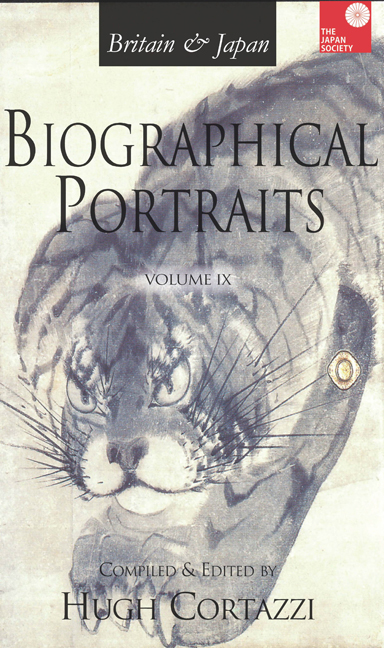Book contents
- Frontmatter
- Contents
- Introduction
- List of Contributors
- Index of Biographical Portraits in Japan Society Volumes
- PART I JAPAN IN BRITAIN: THINGS JAPANESE
- PART II BRITAIN IN JAPAN: TRADE
- BRITISH ACTIVITIES
- MISSIONARIES
- MUSIC, DRAMA AND FILM
- EPISODE
- PAINTERS
- JOURNALISTS
- JAPANESE WOMEN PIONEERS
- PART III SCHOLARS AND WRITERS: JAPANESE
- BRITISH
- PART IV POLITICIANS AND OFFICIALS: JAPANESE
- BRITISH OFFICERS
- BRITISH JUDGES AND A DIPLOMAT
- BRITISH POLITICAL FIGURES
- Index
19 - Britain and Japan: Musical Exchanges before World War II
Published online by Cambridge University Press: 30 April 2022
- Frontmatter
- Contents
- Introduction
- List of Contributors
- Index of Biographical Portraits in Japan Society Volumes
- PART I JAPAN IN BRITAIN: THINGS JAPANESE
- PART II BRITAIN IN JAPAN: TRADE
- BRITISH ACTIVITIES
- MISSIONARIES
- MUSIC, DRAMA AND FILM
- EPISODE
- PAINTERS
- JOURNALISTS
- JAPANESE WOMEN PIONEERS
- PART III SCHOLARS AND WRITERS: JAPANESE
- BRITISH
- PART IV POLITICIANS AND OFFICIALS: JAPANESE
- BRITISH OFFICERS
- BRITISH JUDGES AND A DIPLOMAT
- BRITISH POLITICAL FIGURES
- Index
Summary
INTRODUCTION
AS RELATED IN my portrait of John William Fenton in this volume British music was first played in Japan by a military band, which arrived in Nagasaki in 1854. From then on the military became the main source of Western music in nineteenth century Japan. This was closely related to the modernization priorities of the Meiji Government. After the military the next priority for the Meiji leaders was education and schools. As they sought to create a national system of education, music was temporarily left to one side because of a lack of consensus on what should be taught. British vocal music provided a solution in a unique way.
SCOTTISH FOLK TUNES IN JAPANESE SCHOOLS
During its visit to Britain in 1872 the famous mission led by Iwakura Tomomi made a stop at a school in London during a music lesson. The official record of the mission described in detail how children were learning the basics of music through the clapping of their hands under the teacher's instructions. But this had little impact on music education in Japan.
Luther Whiting Mason, an American music educator, who had been invited to Japan by Isawa Shuji, played a leading role in early music education in Japan. Isawa was one of Mason's former pupils who had become head of the newly established Music Research Institute of the Ministry of Education. Isawa was looking for suitable songs for Japanese school children as his Ministry considered that most traditional Japanese songs were sung at drinking parties or theatrical performances and were thus ‘unhealthy’ for children. Mason and Isawa decided to include as many ‘healthy’ foreign songs as possible in their first music textbook published in 1882. Of its thirty-three songs five were British. They were Auld Lang Syne, The Bluebells of Scotland, Ye Banks and Braes, The Land o’the Leal and Glorious Apollo. With the exception of the last piece, which was written by an eighteenth century English composer Samuel Webbe, all the others were Scottish folk tunes.
Mason proposed the inclusion of these Scottish folk tunes not only because he had been active in Boston, where British cultural influence was still strong, but also because he apparently found certain similarities between Scottish and Japanese traditional songs.
- Type
- Chapter
- Information
- Britain & Japan Biographical Portraits Vol IX , pp. 226 - 235Publisher: Amsterdam University PressPrint publication year: 2015



